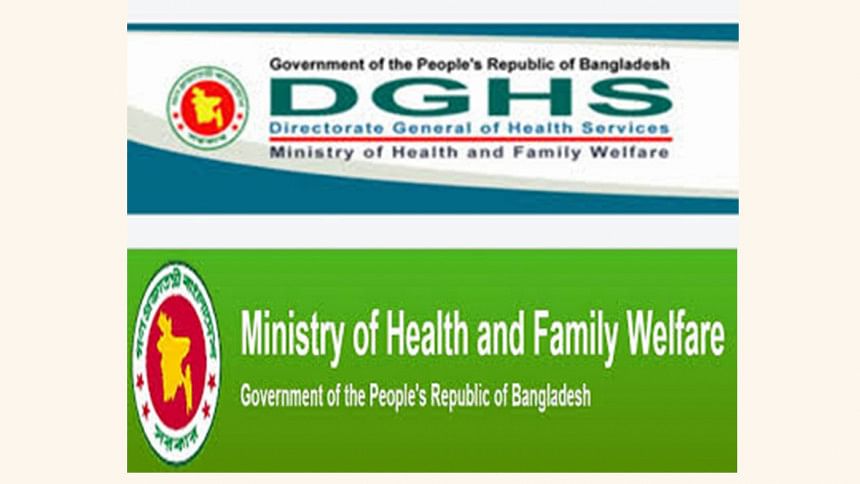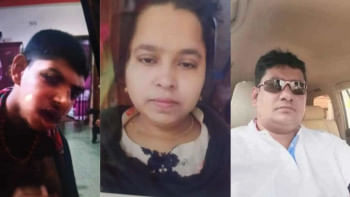Regent and JKG scams: Is this the face of a new normal in healthcare?

Installed on the boundary wall of the Directorate General of Health Services (DGHS) located at the ever-busy Gulshan-Mohakhali Link road, the illuminating electric signboard reads "Healthcare will leap several steps forward in the Mujib Year". Sadly, the very good initiative of the government has turned out to be nothing but mere propaganda by the health bosses. Much ado about nothing and a big fuss over a trifle—corruption and nepotism have taken over healthcare.
Thanks to the pandemic, we now know just how unprepared our health sector is in dealing with it. Over these years, we thought it was a crisis of lack of adequate funding to serve the people. But that is not the case; rather, we have been made a victim of a nexus of corruption. For some in this sector, Covid-19 has emerged as an opportunity to make quick money.
A few months back, when Covid-19 had just made its entry into Bangladesh, doctors started complaining about the poor quality of personal protective equipment. The health bosses then silenced these complaints by issuing several directives. It did not end there, as we now know the names of JKG Health Care and Regent Hospital that were providing fake Covid-19 test reports at a high price. Regent went further by charging a high price for Covid-19 treatment, which the hospital should have done free of cost and be reimbursed from the government later. Instead, it did both.
The law enforcing agencies deserve a big thanks for unearthing the worst-ever health scandal in the history of Bangladesh. But how did all this happen? In both cases, the masterminds were able to establish strong connections with government high-ups. The usual blame game is on, but can these officials deny their responsibility? They cannot, and there must be an independent and impartial enquiry into this scandal.
Interestingly, both scandals have similar patterns involving almost the same individuals. The culprits of JKG Health Care and Regent Hospital first established close contact with the influentials. They even made some friends within the media who very sadly, forgot their journalistic ethics and enabled them, knowingly or unknowingly, in building the cheating syndicate. When all was set, they started preying on the common people.
Was it very difficult to find out the truth? Apart from organising healthcare expo, JKG had no prior experience on public health, let alone managing such a large level of public healthcare operations. Its alleged chairman is a cardiac surgeon who transformed herself very quickly into a public health expert and trained several hundred fake volunteers. Like the Regent boss, the JKG chairman had a very strong social media presence portraying her connection with government high-ups. This organisation opened its YouTube channel on January 6 and updated its domain jkghealthcare.com on April 8, 2020. They allegedly turned the Government Titumir College premises into a personal entertainment place that led to an altercation between the college employees and JKG volunteers.
Sadly, JKG with the help of a section of media was able to portray this incident as an attack on JKG. This was just the tip of the iceberg that led to the unravelling of the biggest ever scam in the name of providing free Covid-19 testing. Surprisingly, some lawmakers even certified JKG Healthcare as a renowned organisation. Even without having any healthcare-related experience, JKG managed to get the approval for collecting Covid-19 samples—thanks to the connections the owners had.
When it comes to the Regent Hospital scandal, we see the same pattern. The Regent boss also seems to have made good connections with political, administrative and media professionals. This influence perhaps helped him to get Covid-19 treatment approval, although the hospital had no valid license. News reports have revealed a track record of fraud by the Regent Hospital boss for years. So how did he manage to cover up all these unscrupulous activities for years? What was the source of his power?
It is evident that without having the support of influential quarters, JKG Health Care and Regent Hospital would never have been able to carry out their operations. While these organisations got blanket approvals, we see a picture of how indigenous Covid-19 testing solution face bureaucratic bottlenecks. Any indigenous invention may have some initial flaws, but that does not necessarily mean it cannot be improved. Instead of quick cooperation from the health and drug bosses of the country, Gonoshasthya Kendra's rapid testing kit faced unfathomable blocks. Had the authorities concerned taken the kit seriously, it could have been improved further and the government could have extended Covid-19 testing to a much larger scale. On the other hand, mushrooming organisations have been able to do healthcare-related business during Covid-19.
Nowadays, we often hear the term "new normal", which refers to the coping strategy in the post-Covid-19 era. Will this be the new normal healthcare in the post-Covid-19 era in Bangladesh? Hopefully not. But these two scandals are not isolated incidents; scams like these have long been feeding on the healthcare system. The DGHS seems to have finally woken up a bit as it cancelled Covid-19 testing approvals awarded to five different hospitals on various grounds. But neither the health ministry nor the DGHS can avoid their share of responsibilities in the blunder, and engaging in a blame game is futile. Those who are responsible for this must be brought to justice.
While government hospitals have performed admirably with limited resources, they have stuck out as "isolated islands" of care in an era when care perhaps should be better distributed. The government may consider a complete overhaul of the healthcare sector and ensure that the people, the disadvantaged and the vulnerable in particular, have access to an efficient healthcare system.
Meer Ahsan Habib is a communication for development professional.
Email: [email protected]

 For all latest news, follow The Daily Star's Google News channel.
For all latest news, follow The Daily Star's Google News channel. 



Comments